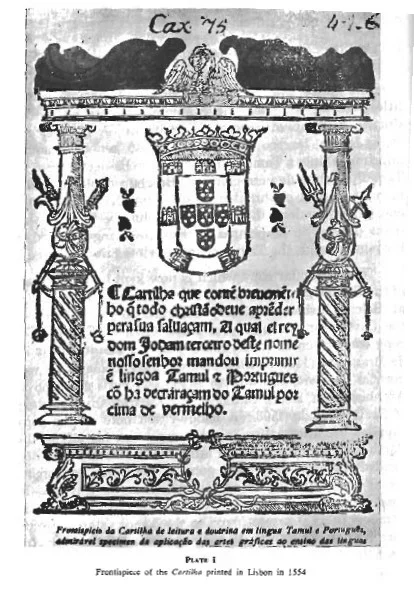List of words Malayalam borrowed from Port/dutch.
Many a words which I thought them to be of pure malayalam are not.. I have highlighted those words which surprised me..
[TABLE="class: wikitable"]
[TR]
[TH="bgcolor: #F2F2F2, align: center"]മലയാളം വാക്ക്[/TH]
[TH="bgcolor: #F2F2F2, align: center"]Malayalam Word[/TH]
[TH="bgcolor: #F2F2F2, align: center"]Meaning[/TH]
[TH="bgcolor: #F2F2F2, align: center"]Original form[/TH]
[/TR]
[TR]
[TD]ആയ[/TD]
[TD]āyā[/TD]
[TD]nurse[/TD]
[TD]aia[/TD]
[/TR]
[TR]
[TD]അലമാര[/TD]
[TD]alamāra[/TD]
[TD]cupboard[/TD]
[TD]armário[/TD]
[/TR]
[TR]
[TD]അള്ത്താര[/TD]
[TD]altāra[/TD]
[TD]altar[/TD]
[TD]altar[/TD]
[/TR]
[TR]
[TD]അണ്ണാറ ചക്ക[/TD]
[TD]Annāra chakka[/TD]
[TD]Pineapple[/TD]
[TD]ananás[/TD]
[/TR]
[TR]
[TD]അസേന്തി[/TD]
[TD]asenthi[/TD]
[TD]Assistant Priest (In a Parish)[/TD]
[TD]assistente[/TD]
[/TR]
[TR]
[TD]കപ്പിത്താന്[/TD]
[TD]capitān[/TD]
[TD]captain[/TD]
[TD]capitão[/TD]
[/TR]
[TR]
[TD]ചായ[/TD]
[TD]chāya[/TD]
[TD]tea[/TD]
[TD]chá[/TD]
[/TR]
[TR]
[TD]ചാവി[/TD]
[TD]chāvi[/TD]
[TD]key[/TD]
[TD]chave[/TD]
[/TR]
[TR]
[TD]
ചാക്ക്[/TD]
[TD]
chākku[/TD]
[TD]
sack[/TD]
[TD]
saco[/TD]
[/TR]
[TR]
[TD]
ഇസ്തിരി[/TD]
[TD]
isthiri[/TD]
[TD]
to iron, to press[/TD]
[TD]
estirar[/TD]
[/TR]
[TR]
[TD]ഇസ്കൂള്[/TD]
[TD]iskool[/TD]
[TD]School[/TD]
[TD]Escola[/TD]
[/TR]
[TR]
[TD]ജനാലാ[/TD]
[TD]janāla[/TD]
[TD]window[/TD]
[TD]janela[/TD]
[/TR]
[TR]
[TD]കളസം[/TD]
[TD]kalasam[/TD]
[TD]shorts/trouser[/TD]
[TD]calção[/TD]
[/TR]
[TR]
[TD]കപ്പേള[/TD]
[TD]Kappela[/TD]
[TD]Chapel[/TD]
[TD]capela[/TD]
[/TR]
[TR]
[TD]കാപ്പിരി[/TD]
[TD]kāppiri[/TD]
[TD]black, african[/TD]
[TD]
cafre[/TD]
[/TR]
[TR]
[TD]കറൂപ്പ്[/TD]
[TD]karoopp[/TD]
[TD]A type of fish (Grouper)[/TD]
[TD]garoupa[/TD]
[/TR]
[TR]
[TD]
കസേര[/TD]
[TD]
kasera[/TD]
[TD]
chair[/TD]
[TD]
cadeira[/TD]
[/TR]
[TR]
[TD]കശുവണ്ടി[/TD]
[TD]kasuvandi[/TD]
[TD]cashew[/TD]
[TD]caju[/TD]
[/TR]
[TR]
[TD]
കടലാസ്[/TD]
[TD]
kadalas[/TD]
[TD]
paper[/TD]
[TD]
cartaz[/TD]
[/TR]
[TR]
[TD]
കദ്രീഞ്ഞ[/TD]
[TD]
kadreenha[/TD]
[TD]
stool[/TD]
[TD]
cadeirinha[/TD]
[/TR]
[TR]
[TD]കോപ്പ[/TD]
[TD]kōppa[/TD]
[TD]cup, dish[/TD]
[TD]copo[/TD]
[/TR]
[TR]
[TD]കൊവേന്ത[/TD]
[TD]kovenda[/TD]
[TD]convent[/TD]
[TD]convento[/TD]
[/TR]
[TR]
[TD]കുമ്പാരി[/TD]
[TD]kumbāri[/TD]
[TD]Godparents of your child/ children or Parents of your Godchild[/TD]
[TD]Compadre[/TD]
[/TR]
[TR]
[TD]കുരിശ്[/TD]
[TD]kurishu[/TD]
[TD]Cross[/TD]
[TD]Cruz[/TD]
[/TR]
[TR]
[TD]കുശിനി[/TD]
[TD]kushini[/TD]
[TD]kitchen[/TD]
[TD]cozinha[/TD]
[/TR]
[TR]
[TD]ലേലം[/TD]
[TD]lelam[/TD]
[TD]auction[/TD]
[TD]leilão[/TD]
[/TR]
[TR]
[TD]മേശ[/TD]
[TD]mesha[/TD]
[TD]table[/TD]
[TD]mesa[/TD]
[/TR]
[TR]
[TD]മേസ്തിരി[/TD]
[TD]mesthiri[/TD]
[TD]foreman[/TD]
[TD]mestre[/TD]
[/TR]
[TR]
[TD]ഓസ്തി[/TD]
[TD]ōsthi[/TD]
[TD]Sacramental bread/ wafer[/TD]
[TD]hóstia[/TD]
[/TR]
[TR]
[TD]
പാര[/TD]
[TD]
pāra[/TD]
[TD]
Crowbar[/TD]
[TD]
barra[/TD]
[/TR]
[TR]
[TD]പാതിരി[/TD]
[TD]pāthiri[/TD]
[TD]priest,pastor[/TD]
[TD]padre[/TD]
[/TR]
[TR]
[TD]പദ്രിഞ്ഞപ്പന്[/TD]
[TD]pardinhappan[/TD]
[TD]God Father[/TD]
[TD]Padrinho[/TD]
[/TR]
[TR]
[TD]പദ്രിഞ്ഞമ്മ[/TD]
[TD]pardinhamma[/TD]
[TD]God Mother[/TD]
[TD]Madrinha[/TD]
[/TR]
[TR]
[TD]പേന[/TD]
[TD]pena[/TD]
[TD]pen[/TD]
[TD]pena[/TD]
[/TR]
[TR]
[TD]പേര[/TD]
[TD]pera[/TD]
[TD]pear, guava[/TD]
[TD]pera[/TD]
[/TR]
[TR]
[TD]പിക്കാസ്[/TD]
[TD]pikkās[/TD]
[TD]Pickaxe[/TD]
[TD]picão[/TD]
[/TR]
[TR]
[TD]പീലാസ്[/TD]
[TD]peelās[/TD]
[TD]Godchild[/TD]
[TD]afilhado[/TD]
[/TR]
[TR]
[TD]റാന്തല്[/TD]
[TD]rānthal[/TD]
[TD]lamp, lantern[/TD]
[TD]lanterna[/TD]
[/TR]
[TR]
[TD]
റാത്തല്[/TD]
[TD]
rāthal[/TD]
[TD]
a Pound (1 lb.), weight of sixteen ounces (16 oz.)[/TD]
[TD]
arrátel[/TD]
[/TR]
[TR]
[TD]റേന്ത[/TD]
[TD]renda[/TD]
[TD]lace work[/TD]
[TD]renda[/TD]
[/TR]
[TR]
[TD]സാത്താന്[/TD]
[TD]sāttān[/TD]
[TD]satan[/TD]
[TD]satan[/TD]
[/TR]
[TR]
[TD]
സവാള[/TD]
[TD]
savāla[/TD]
[TD]
onion[/TD]
[TD]
cebola[/TD]
[/TR]
[TR]
[TD]സെമിത്തേരി[/TD]
[TD]semithery[/TD]
[TD]cemetery, burial ground[/TD]
[TD]cemitério[/TD]
[/TR]
[TR]
[TD]തമ്പാക്ക്[/TD]
[TD]thampākk[/TD]
[TD]Tobacco[/TD]
[TD]tabaco[/TD]
[/TR]
[TR]
[TD]തിര[/TD]
[TD]tira[/TD]
[TD]Gun Shot[/TD]
[TD]tiro[/TD]
[/TR]
[TR]
[TD]തീരുവ[/TD]
[TD]teeruva[/TD]
[TD]customs duty[/TD]
[TD]tarifa[/TD]
[/TR]
[TR]
[TD]
തൊപ്പി[/TD]
[TD]
toppi[/TD]
[TD]
hat[/TD]
[TD]
topo[/TD]
[/TR]
[TR]
[TD]തൂവാല[/TD]
[TD]tuvāla[/TD]
[TD]towel[/TD]
[TD]toalha[/TD]
[/TR]
[TR]
[TD]വാത്ത[/TD]
[TD]vātha[/TD]
[TD]Goose[/TD]
[TD]Pata[/TD]
[/TR]
[TR]
[TD]വരാന്ത[/TD]
[TD]varāntha[/TD]
[TD]open porch[/TD]
[TD]varanda[/TD]
[/TR]
[TR]
[TD]
വീപ്പ[/TD]
[TD]
veeppa[/TD]
[TD]
wooden cask, barrel[/TD]
[TD]
pipa[/TD]
[/TR]
[TR]
[TD]വീഞ്ഞ്[/TD]
[TD]Veenh[/TD]
[TD]Wine[/TD]
[TD]vinho[/TD]
[/TR]
[TR]
[TD]വികാരി[/TD]
[TD]vikāri[/TD]
[TD]vicar[/TD]
[TD]vigário[/TD]
[/TR]
[TR]
[TD]വിനാഗിരി[/TD]
[TD]vināgiri[/TD]
[TD]vinegar[/TD]
[TD]vinagre
[/TD]
[/TR]
[/TABLE]
DUTCH
[TABLE="class: wikitable"]
[TR]
[TH="bgcolor: #F2F2F2, align: center"]മലയാളം വാക്ക്[/TH]
[TH="bgcolor: #F2F2F2, align: center"]Malayalam Word[/TH]
[TH="bgcolor: #F2F2F2, align: center"]Meaning[/TH]
[TH="bgcolor: #F2F2F2, align: center"]Original form[/TH]
[/TR]
[TR]
[TD]അടുതാപ്പ്[/TD]
[TD]aduthappu[/TD]
[TD]potato[/TD]
[TD]Aardappel[/TD]
[/TR]
[TR]
[TD]
കക്കൂസ്[/TD]
[TD]
kakkūs[/TD]
[TD]
Toilet[/TD]
[TD]
kakhuis[/TD]
[/TR]
[TR]
[TD]കള്ക്ക്[/TD]
[TD]Kalkku[/TD]
[TD]turkey[/TD]
[TD]Kalkoen[/TD]
[/TR]
[TR]
[TD]കാപ്പി[/TD]
[TD]Kaappi[/TD]
[TD]coffee[/TD]
[TD]Koffie[/TD]
[/TR]
[TR]
[TD]കോക്കി[/TD]
[TD]Kokki[/TD]
[TD]Chef/ Cook[/TD]
[TD]kokin[/TD]
[/TR]
[TR]
[TD]തപാല്[/TD]
[TD]Thapal[/TD]
[TD]Post[/TD]
[TD]Tapal[/TD]
[/TR]
[/TABLE]
 Portuguese influence in the life of Tamils was so strong that many words from Portuguese language has become normal use in Tamil vocabulary today. அவற்றில் சில
Portuguese influence in the life of Tamils was so strong that many words from Portuguese language has become normal use in Tamil vocabulary today. அவற்றில் சில  Portuguese influence in the life of Tamils was so strong that many words from Portuguese language has become normal use in Tamil vocabulary today. அவற்றில் சில
Portuguese influence in the life of Tamils was so strong that many words from Portuguese language has become normal use in Tamil vocabulary today. அவற்றில் சில 
